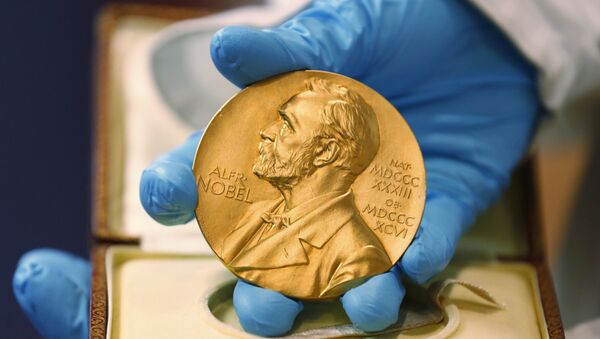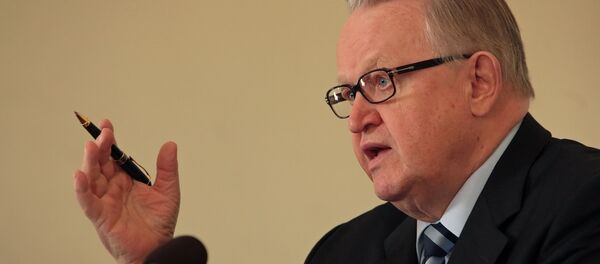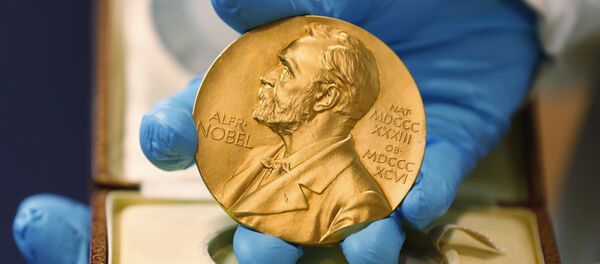While the technology is already being used in medicine and making self-healing materials, the trio's work was the first to replicate mechanisms used by living cells in converting chemical energy into motion.
The award ceremony is scheduled to be held in Stockholm on December 10, the anniversary of prize's founder Alfred Nobel.
JEAN-PIERRE SAUVAGE
French chemist Jean-Pierre Sauvage was born in Paris on October 21, 1944.
In 1971, he earned a Ph. D. at the University of Strasbourg, France under the guidance of famous chemist Jean-Marie Lehn. He conducted post-doctoral research at the University of Oxford under the guidance of chemist Malcolm Green.
In 1971-1979, he was a research associate with France’s National Center for Scientific Research (CNRS). He then became the director for research at CNRS, a position he held between 1979 and 2009.
In 1981-1984, he was a professor with the University of Strasbourg.
In 2009-2010, Sauvage was a visiting professor with the University of Zurich.
In 2010-2012, he was a visiting research associate with the Northwestern University in Illinois in the United States.
Since 2009, he has been an honorary professor with the University of Strasbourg and an honorary CNRS director.
He has been an associate member of the French Academy of Sciences since 1990 and has been its full-time member since 1997.
Sauvage has pioneered research in the area of mechanically-interlocked molecular architectures.
FRASER STODDART
In 1967-1969, he conducted doctoral research at Queen’s University in Canada.
In 1970-1982 and 1982-1991, he was a reader and a lecturer with the University of Sheffield in the United Kingdom.
In 1990-1997, he was a professor with the University of Birmingham.
In 1997-2007, Stoddart was a professor with the University of California, Los Angeles.
In July 2002, he was appointed the acting co-director of the California Nano-Systems Institute (CNSI) before becoming director on May 1 the following year.
Since 2008, he has been a professor with the Northwest University in the United States as well as an honorary professor of chemistry with the University of California, Los Angeles. He also heads the Center for the Chemistry of Integrated Systems (CCIS) at the Northwest University.
Stoddart is among the few chemists who have opened up a new area of organic chemistry. The chemist is responsible for creating the field of supramolecular chemistry that deals with systems made up of molecular components and the processes of molecular recognition and self-assembly.
He has received various prizes for his work. In 2004, Stoddart received the Nagoya Gold Medal Prize in the area of organic chemistry. In 2007, he was presented the King Faisal International Prize and the Albert Einstein Prize. In 2008, he got the Arthur C. Cope Award and the Royal Society of London Davy Medal.
Stoddart has received honorary DSc degrees from institutions such as the University of Birmingham, the University of Twente in the Netherlands, the University of Sheffield, Trinity College in Dublin and the University of St. Andrews.
He has been a member of the American Academy of Arts and Sciences since 2012 and the National Academy of Sciences since 2014. He is an honorary member of the Royal Society of Edinburgh since 2008 and the Royal Society of Chemistry since 2011.
In 2007, he was appointed a Knight Bachelor by Queen Elizabeth II of the United Kingdom for his achievements in chemistry. In 2010, he received the Royal Medal of the Royal Society of Edinburgh.
BERNARD LUCAS FERINGA
In 1978, he defended a Ph. D. thesis at the same University’s faculty of organic chemistry.
In 1978-1982, he worked as a research chemist and specialized in organic synthesis, oxidization processes and photochemistry at a laboratory of the Dutch-UK oil and gas giant Royal Dutch Shell.
In 1979-1982, he lectured at Hogere Analistenschool in Amsterdam.
In 1982-1983, Feringa worked for Shell Biosciences Laboratories in Sittingbourne in the United Kingdom.
In 1983-1984, he headed the Homogeneous Catalysis project at Shell Research Laboratories in Amsterdam.
In 1984-1988, he taught organic chemistry at the University of Groningen.
In 1988, he became a professor with the faculty of organic chemistry at the University of Groningen.
In 1991-1995, he headed the Department of Organic and Molecular Inorganic Chemistry.
In 2003-2011, he headed the Stratingh Institute for Chemistry at the University of Groningen.
His research interests include stereochemistry, organic synthesis, asymmetrical catalysis and molecular nanosystems.
Feringa is a member of the European Academy, a foreign member of the American Academy of Arts and Sciences and a member of the Royal Netherlands Academy of Arts and Sciences.
His research has won a number of awards, including the Pino Gold Medal of the Italian Chemical Society in 1997, the Columbia University’s Guthikonda Award in 2003, the Koerber European Science Award also in 2003, the Arthur C. Cope Late Career Scholars Award of the American Chemical Society in 2015, Japan’s Yamada-Koga Prize and Nagoya Gold Medal Prize in 2013 in the area of organic chemistry, among others.







